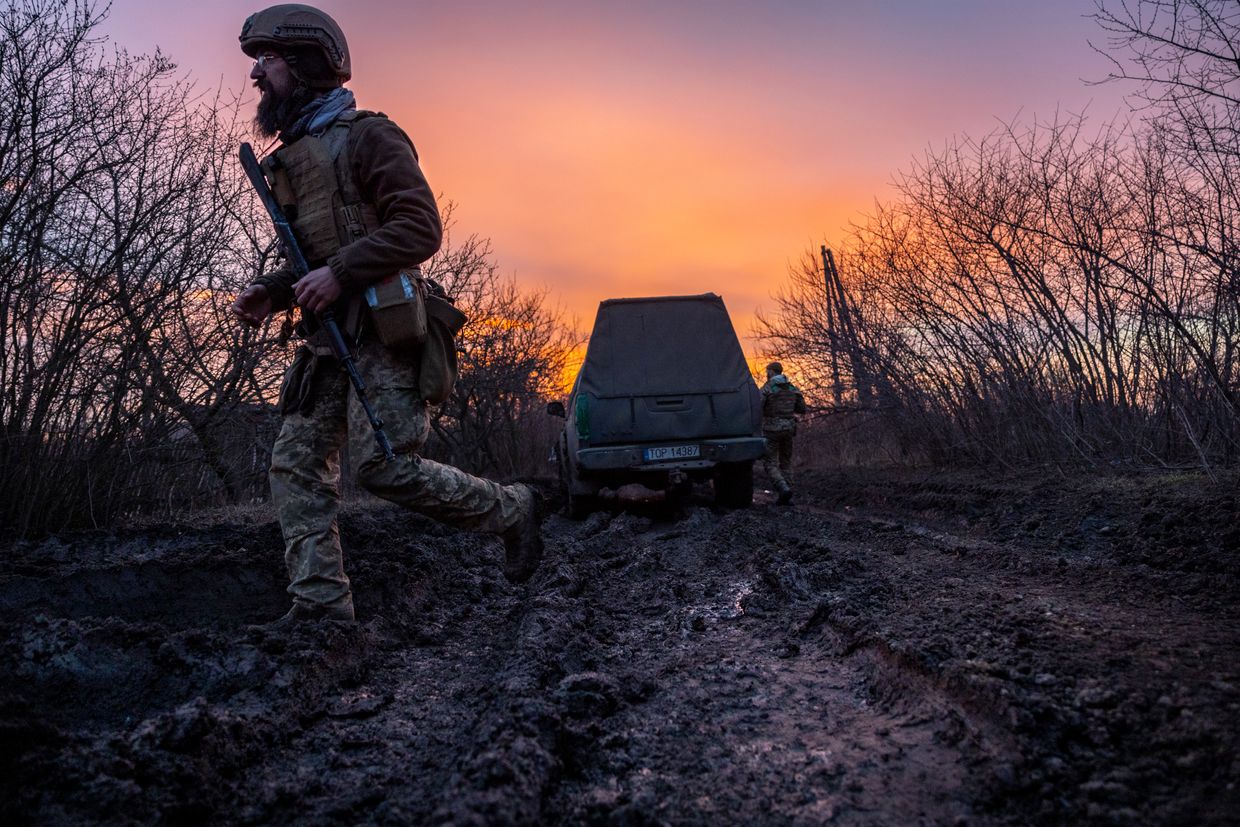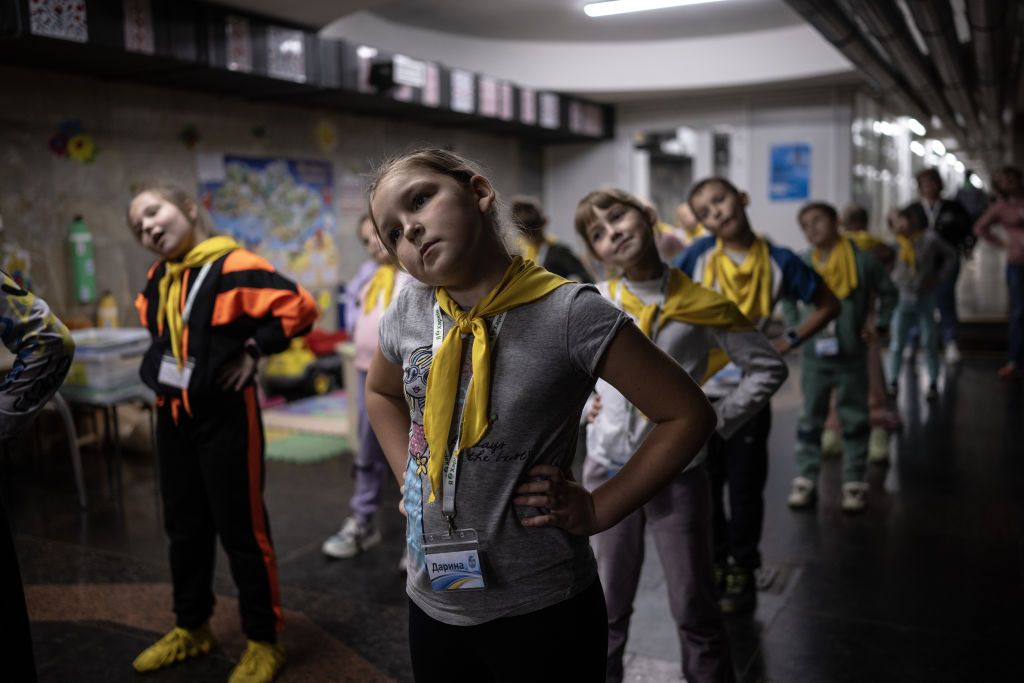The Counteroffensive: Russia’s rising chemical weapons use in Ukraine

Servicemen with Ukraine's National Guard undergo training to storm enemy trenches using simulation equipment amid Russia's ongoing war against Ukraine in Kharkiv Oblast, Ukraine, on Feb. 29, 2024. (Stringer/Anadolu via Getty Images)

Tim Mak
Editor’s Note: This article was published by the blog “The Counteroffensive with Tim Mak” on March 22, 2024, and has been re-published by the Kyiv Independent with permission. To subscribe to "The Counteroffensive," click here.

Aahed Bakkora will never forget the night that birds began falling out of the sky. An engineer by training, he was working for a local city council in Jobar, an area just outside Damascus, Syria. At the time, the area was controlled by Syrian opposition forces that had risen up against Bashar al-Assad in the early 2010s.
At around 2 a.m., in the early morning hours, he heard an unfamiliar noise in the air. Then, he heard a sharp voice over the walkie-talkie he carried for city council work: “People are dying in the street!” He immediately rushed his family into the bathroom and ran outside to help, not knowing the terror that was unfolding.
“I saw a lot of bad things in my life,” Aahed sighed. “But this night, it was like the last day of the world."
Bakkora didn’t realize it then, but he was about to become one of the victims of the Ghouta chemical attacks in Syria, strikes by the Bashar Al-Assad regime in 2013 that became notorious for the hundreds of people it ultimately killed due to Sarin gas nerve agent.
The attacks have also become notorious for being a critical inflection point in the way the West responded to chemical weapons. At the time, then U.S. President Barack Obama threatened that employing these kinds of attacks was a “red line” and could lead to military intervention.
It ultimately did not. Obama’s hollow threat sent a message – Aahed and chemical weapons analysts agree – it told the world that an authoritarian could illegally use chemical weapons, and not have to face justice for it.


This leads us to the escalating situation in Ukraine. Earlier this month, the Ukrainian military claimed that Russia has used chemical weapons 1,068 times since its full-scale invasion of Ukraine began two years ago. This includes allegations that Russia used chloroacetophenone, a chemical comparable to tear gas but with higher toxicity. A Russian commander even openly bragged about using chemical weapons last year.
The usage of these chemicals on the battlefield is "unquestionably" illegal, said Brett Edwards, who specializes in chemical weapons issues and lectures at the University of Bath. It goes against the Chemical Weapons Convention, to which Russia is a signatory.
While Russia is not using nerve gas like it did in Syria, experts warn that the usage of chemicals as an instrument of warfare could be a test of the world’s resolve.
“There're lots of videos of Russians dropping tear gas grenades to clear tunnels… Russian media is now reporting hundreds of cases,” Edwards said.
“Allowing Russia to use (riot control agents) in this way unpunished would allow for the use of an increasing range of increasingly deadly agents on the battlefield.”
Aahed thinks about the increasing chemical weapons usage by Russia through the lens of that one terrible night in Syria back in 2013. When he got out into the street a series of horrors unfolded before him. He saw someone on a bike collapse on the street, dying, he remembers, as if someone had pressed a button. There was little light due to a lack of power, a common occurrence during the Syrian civil war. Aahed’s eyes began to water and things began to blur.
“I started feeling something hot in my eyes, and started losing my focus,” he recalled. He stumbled to his nearby car and began evacuating people on the street to the nearest hospital.
“Nobody can collate the (number of) people who were killed that night because it was crazy. No electricity, nothing,” he told The Counteroffensive.
“People running. Wallahi (Arabic for 'I swear to God,’), when I was driving my car, birds were falling down from the sky. The birds. Imagine this situation. Oh my God.”
The attacks took place just a few hundred meters from where Aahed lived. Ninety percent of the people in his immediate area were killed by those attacks, he said. When he got to the hospital, he remembered that in his rush to evacuate people from the street, he forgot a critical thing: his family was still in his apartment. He rushed back to his home.
Thankfully the air currents were pushing the gasses away from the apartment, and he found his family where he left them, safe in the bathroom. They rushed away from the scene of the attacks, later finding a checkpoint where oxygen was being administered. Later in the night, they found a place where atropine, a medication that counteracts nerve agents like Sarin gas, was being provided to victims.

Aahed’s close friend, a neighbor, was not so lucky. He died in their home. His friend's wife died in their kitchen. Their kids died in their beds.
The horrific event was compounded by the lack of action from the rest of the world, he said.
"Even now I don't understand. After what's happening in Ukraine, in Syria, and everywhere, I don't believe in the United States,” Aahed told us.
American inaction, after the sarin gas attacks in Syria, he added, “gave the Russians the green light to do everything.”
And now, with emerging evidence of increasing Russian chemical weapons use, Russian President Vladimir Putin may be following the Assad playbook – escalating usage of chemical weapons to test the international will to respond and condemn him.
“I think that the world is afraid to push the (Organization for the Prohibition of Chemical Weapons) to its breaking point. It’s possible that Russia could just tear up the (Chemical Weapons Convention) and that would be bad,” said Dan Kaszeta, a chemical weapons specialist at the U.K. think tank RUSI.
"Any such investigation would be politically fraught," added Edwards, pointing out that Ukraine has been subject to tens of thousands of alleged war crimes. "This is just one of many war crimes and human rights violations that (governments) are thinking about."
Aahed says he cannot clear his mind of the memories from that night. While many years have passed since the attacks, he urged the world to hold the two authoritarians responsible.
“If we don't stop the person who is doing the crimes… Nothing will stop him. Russia wants to build their power to (control) the world. If we don't stop them, they will not stop in Ukraine or in Syria – they will (keep) crossing (boundaries).”
Editor’s Note: The opinions expressed in the op-ed section are those of the authors and do not purport to reflect the views of the Kyiv Independent.












